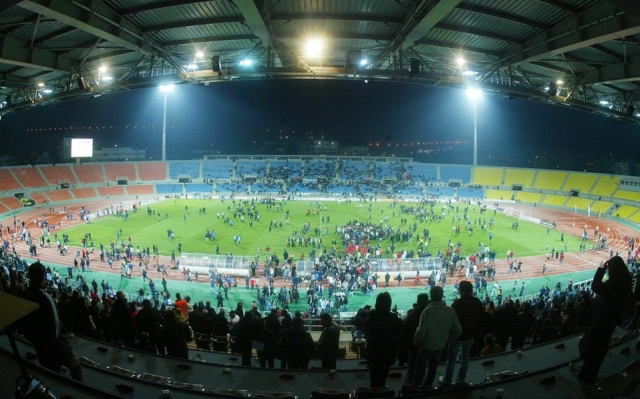Picture: www.vulpinews.gr
Owners and managers of Greek football teams are said to be the initiators of the so-called fixed matches. This is what footballers said for a survey called ‘Don’t Fix it’, conducted by Birbeck University of London with the support of FIFPro, UEFA, and the EU.
The survey was conducted in the autumn of 2013 with 1,585 players from nine European countries (England, Finland, Hungary, Italy, Norway, Romania, Scotland, and Slovenia) and 211 football players from Greece.
The players were asked 17 questions about the past season.
According to the findings in the report, match-fixing is a major issue in Greece. The reasons behind the problem are mainly related to: a) football club owners, some of them already ill-reputed; b) power relations between big and small teams; c) the activity of criminal groups who have infiltrated football clubs; and d) the delicate economic situation in the country, although the fixed-matches phenomenon appeared before the onset of the crisis.
13.7 per cent of the Greek players interviewed, said that they had played a fixed match, while 12.8 per cent replied someone had approached them trying to fix a match.
In addition, 64 per cent of interviewed players from Greece pointed out that they had their good reasons to suspect that some matches in Greek championships are fixed. The percentage is 13.6 in Romania, 11.8 in Italy, and 10.4 in Slovenia, which means that in Greece the problem is far more serious than it is in other European countries.

The players’ reply to the question who initiates match-fixing is quite revealing, too. 48.8 per cent respond that these are team managers and executives; 20.6 per cent say these are bookmakers and former football players; 16.7 per cent say matches are fixed by referees or the whole panel of referees.
‘The percentage being so high, we must focus our attention on club owners and managers,’ says the report in its comments on Greece. As to the question ‘What is the most common reason that may make someone fix a match?’ the majority of interviewees (33 per cent) say that it is mainly financial problems. This reply may be added to the two most common answers to the question ‘What can protect football players against match-fixing?’ 29.4 per cent of footballers reply it is the prompt payment of their salaries, and 25 per cent see pay rise as a solution. Therefore, the report says, working conditions and prompt payment of salaries should be a priority.
When asked whom they would trust to signal an approach to manipulate a game, 70.8 per cent of footballers say they trust the Pan-Hellenic Association of Professional Football Players (PASP). Only a small percentage would trust the Hellenic Football Federation – just 2.4 per cent. The percentage of players who would trust the police is just as low – 3.8 per cent. 71.4 per cent of football players did not signal any authorities when they suspected that a match was manipulated. 40.3 of them say they did not trust the responsible bodies, while 17.1 per cent did not have the support of their football club or authorities.
The report also mentions the relegation of Olympiacos (Volos), Kavala, and Makis Psomiadis.
The survey concludes that all parties included in the interview are susceptible to the phenomenon of fixed matches and methods used to fix a game are largely the same, yet the ill practice has its distinct features in separate countries.